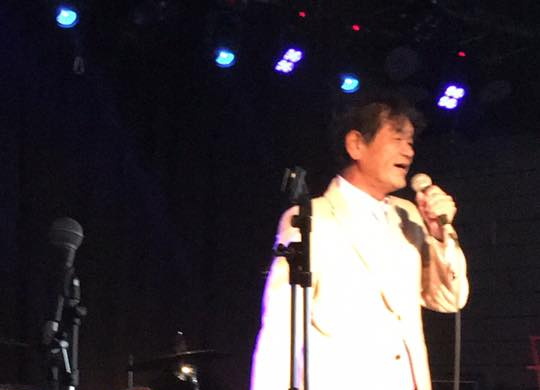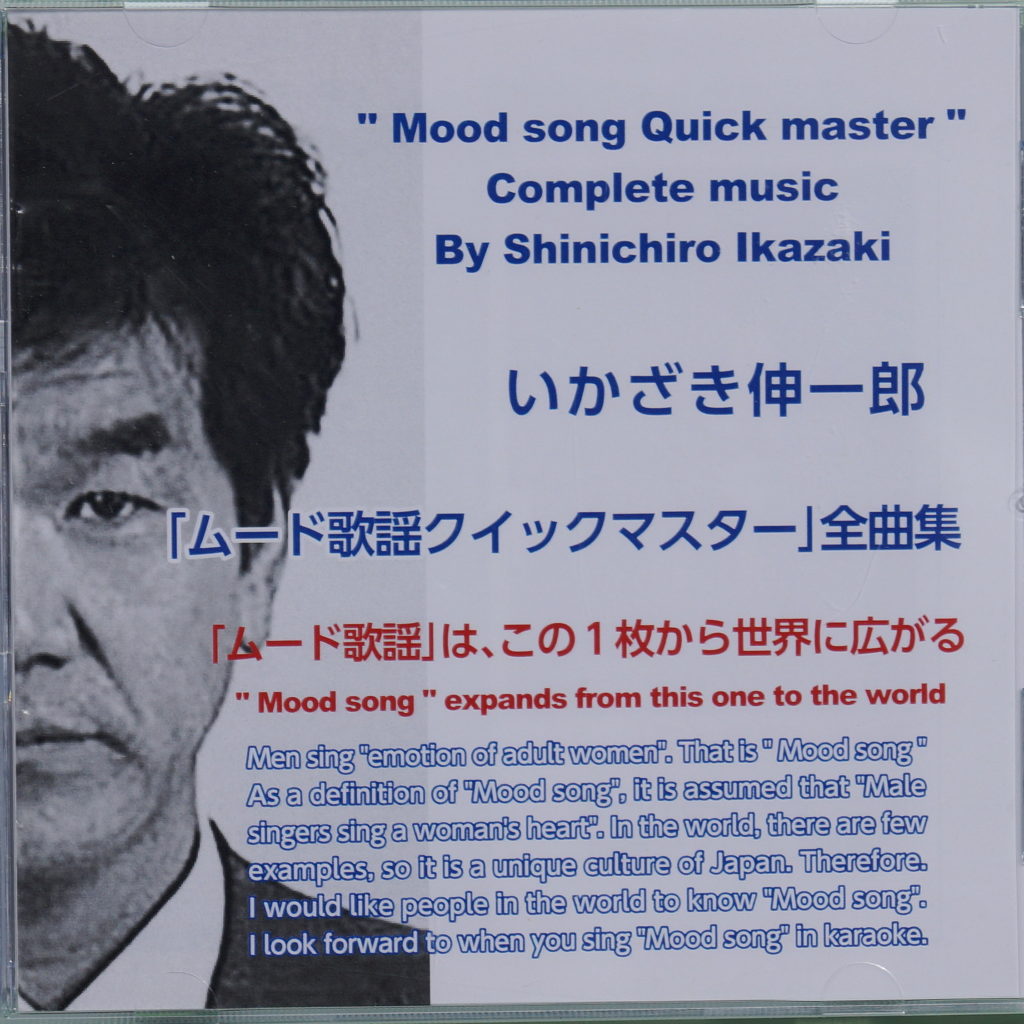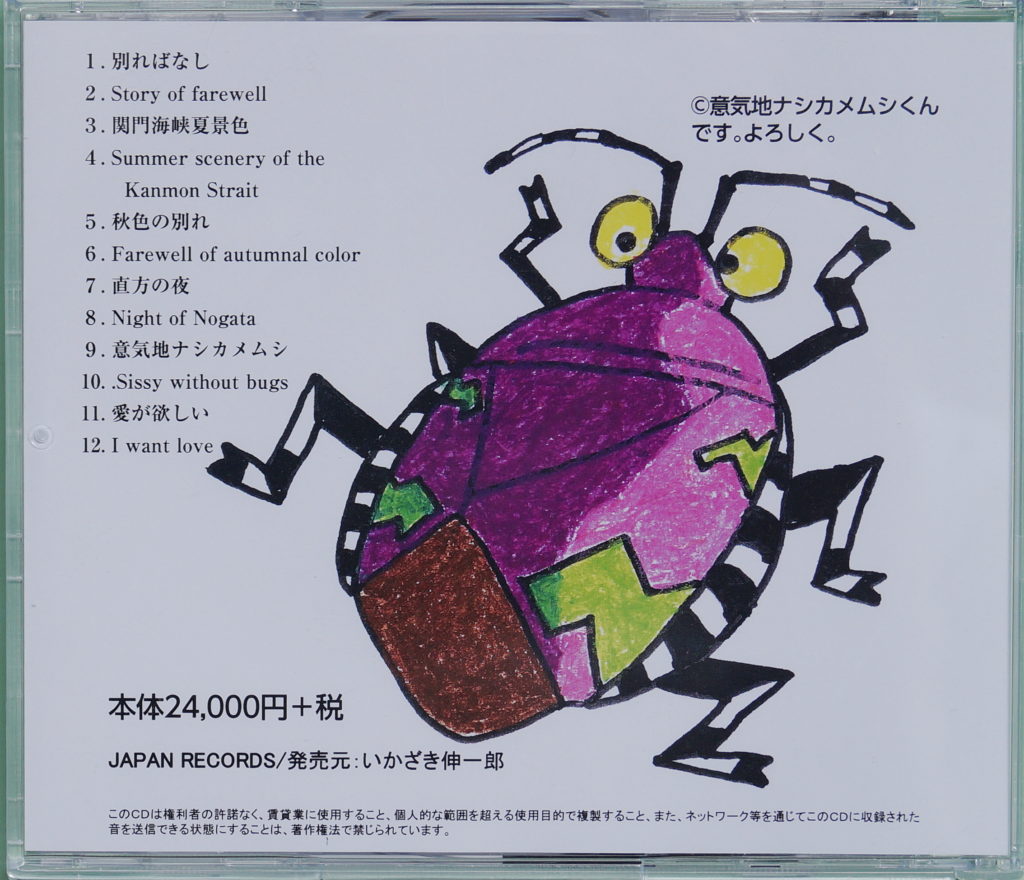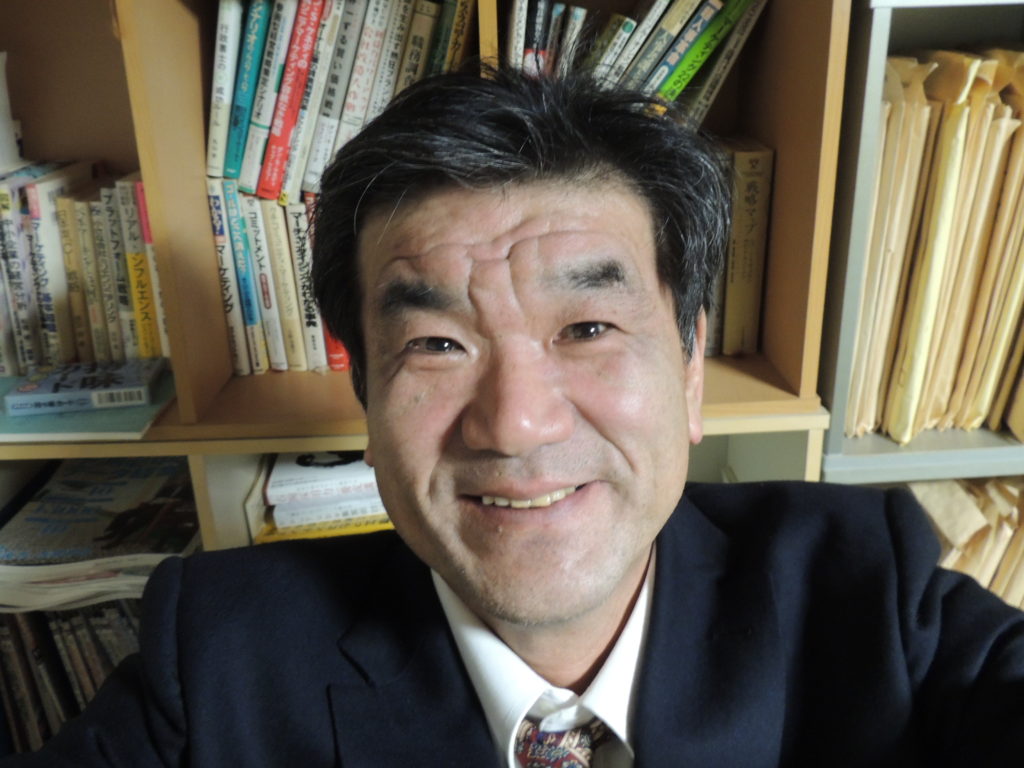
Singing with a concert 
Of course! Talk too. 
Taking insects! 
I’m working?
●ごきげんいかがですか?歌手のいかざき伸一郎です。
ムード歌謡を歌ってます。
では、さっそく聴いてください。「別ればなし」
●1番、(歌)「別ればなし」5分
●(MC)5分
(前に、付箋台を置き、スケッチブックを載せる)
(スケッチブック1枚目:「60歳から覚えてね!英単語コーナー」の文字見せながら)
ありがとうございました。(深く礼をする)
じつは私、今。英単語を覚えています。
ただ。年を取ったらダメですね。覚えることはできるのですが。その後は残念!
リアルに表現すれば、ザルで水をすくうようなもの。
せっかく覚えた英単語が、頭からザーザーとこぼれ落ちてしまいます。
Thank you very much
Actually, I am studying English words now.
However, it is not good if you get older. I can remember, but sorry afterwards!
After that, it will be disappointing.
If you express it realistically. Kind of like drawing water in a colander.
The English words that I have learned are spilled out of my head.
むかし。年表や英単語を覚えるための文書がありましたよね。
そして。一度覚えたら、忘れませんでしたよね。
そうです。そんな文書を、英単語ごとにつくればいいんです。
Old days. There were documents for memorizing chronological tables and English words.
And. Once you remember, you did not forget.
That’s right. Just create such a document for each English word.
そして。TOEICテストによく出る英単語が、手軽に覚えられるよう!
作詞家でもある私、いかざき伸一郎は、心に残るよう、英単語を作詞しました。
そして。その文書を、みなさんに紹介します。
「60歳から覚えてね!英単語」コーナー。を、開催します。お楽しみに~。
And. English words frequently used in the TOEIC test can be easily remembered!
Shinichiro Ikazaki, who is also a lyricist, wrote English words in a memorable way.
And. I will introduce that document to everyone.
The ” Japanese language course from 60 years old ” corner will be held.
Let’s looking forward to it!
では、さっそく、はじめます。
今回のテーマは、食欲の秋。
(スケッチブック2枚目:「食欲の秋で覚える英単語」の文字見せる)
今回は。食欲の秋。です。
10月です。10月と言えば。前回。スポーツの秋。やったので。今回は。読書の秋?それ。この3人には。似合わね~だろ。なら。私、いかざき伸一郎。いちよ。ムード歌謡歌手なので。芸術の秋!がいいと思います。それもなしだな。なんで!やっぱり。ここは。無難に。食欲の秋。だな。
桃太郎さん桃太郎さん お腰につけた黍団子♪ 童謡・唱歌の「桃太郎♪」
よかったですね・・・・・。鳥のもも肉の「山賊焼き」
おいおい!ちょっと待て!「もも」つながりなら。ここは。やっぱり。桃尻娘・竹田かおりちゃんの。ミニスカートじゃね~んかよ!そうなんですよ川崎さん。竹田かおりさんの。ミニスカート。いいですよね。私は。竹内まりやさんの。ピーチパイ。の方が好きですが。私、伸一郎も。です。ジャンジャン。ちょっと待ってください山本さん。「不思議なピーチパイ♪」のことか?うんうん。あのピーチパイは。てめ~らが。思ってるピーチパイと。ちゃうで!え!あのピーチパイと。ちがうんですか?そうだ!ジャンジャン。ところで。私、伸一郎は。「梨」も好きです。うそつけ~!ただ。最後を。「・・・用無しです」で。締めて~だけだろ。だから。「梨」は。なしなし。梨だけに。ちょっと待っちょくり~。栗だけに。「栗」と言えば。山口県にも。特産あるな~。厚保(あほ)くり?ちゃう!厚保(あつ)くり。「アホ」じゃなく「アツ」て読むんだ!あやまれ~!ところで。「食欲の秋」で話しても。この3人じゃ~。話。膨らまね~な~。うんうん。「栗と言えば」で。話進めようか。うんうん。「栗と言えば」。「ザ・たっち」。・・・。「そっくり」。ザ・リリーズちゃんら、リンリン・ランランちゃんらも。だな。「栗と言えば」。「大都会」。・・・。「クリスタルキング」。あ~あ~。だな。「栗と言えば」。「夜道は気をつけて!」・・・。「ひったくり」。刑務所おくり。だな。「栗と言えば」。「鳥のもも肉」・・・。「クリスマス」。七面鳥か。「栗と言えば」。「栗饅頭」・・・。それ。そのまんま。じゃ~ね~か。そのまんま東?ちゃう!全然ひねってね~じゃ~ね~か!他は?!「栗ごはん」「甘ぐり」「モンブラン」などなど。・・・。テーマは「食欲の秋」。本筋から考えると。その方が「しっくり」来ますね~。栗だけに。おいおい!ちょっと待て!まだ。そのパターン。「くり返す気か!」。栗だけに。なんちゃって。そんな気持ちで。英単語を覚えましょう!
では。まずは、こちら。
So, let’s get started.
The theme this time is. Let’s learn Japanese with Autumn appetite season.
It’s October. Speaking of October. Last time, it was autumn, the season for sports. This time, it’s autumn, the season for reading? That theme doesn’t suit the three of us. In that case, I, Shinichiro Ikazaki, am a mood pop singer, so I think “Autumn of the Arts!” would be good. That too will be rejected. Why! As expected, the theme is a safe one: autumn, the season for appetite.
Momotarosan momotarosan okoshini tsuketa kibidango♪Children’s song “Momotaro♪”
It was good! ・・Chicken thigh meat “Sanzoku-yaki”
Wait a minute. Wait a minute~! If it’s related to “peach”. In this case. Honestly. Wouldn’t it be better the Peachy-assed girl Kaori Takeda-chan’s miniskirt. That’s right, Kawasaki-san. Ms. Kaori Takeda’s mini skirt. It’s nice, isn’t it? I prefer Ms. Mariya Takeuchi’s Peach Pie though. Me too, Shinichiro. Jean Jean. Please wait a moment, Yamamoto-san. Are you talking about “Mysterious Peach Pie ♪”? Mmhmm. That peach pie is not the peach pie you think it is! Eh! Is it different from that peach pie? Yes! Jean Jean. By the way, I, Shinichiro, like pears as well as peaches. You’re lying! You just want to end it with “… not needed”. So, “pear” is nashi, Because pear. Just wait a minute. Because chestnut. Speaking of chestnuts, Yamaguchi Prefecture has a specialty. Ahokuri? No! Atsukuri. It’s not pronounced “aho” but “atsu”! Apologize! By the way, even if we talk about “Autumn, the season for appetite,” the conversation won’t really flow with just the three of us. Uh-huh. Shall we continue the conversation by “Speaking about chestnuts? ” Uh-huh. “Speaking of chestnuts.” “The Touch.” … “Look-alike”. The Lilies-chans and Ling Ling Lan Lan-chans too. “Speaking of chestnuts.” “Big city.” … “Crystal King.” Ahhh. That’s it. “Speaking of chestnuts.” “Be careful on the roads at night!”… “Purse snatching.” That guy deserves to be sent to prison. “Speaking of chestnuts” “Chicken thighs” … “Christmas” Turkey? “Speaking of chestnuts”… “Chestnut buns”… That’s exactly what it sounds like. “Sonomanma Higashi?” No way! You don’t twist answer at all! What else?! “Chestnut rice”, “Sweet chestnut”, “Mont Blanc”, etc. … The theme is “Autumn is the season for appetite.” Thinking about the main topic, that would be more “appropriate.” Because chestnuts. Wait a minute. Wait a minute~! Are you going to repeat that pattern again? Because chestnuts. Just kidding.Let’s learn Japanese words with that feeling!
OK. First, here.
(スケッチブック3枚目:「下記の単語を書いた」の文字見せながら)
Completely
完全に、手も足も出ない、徹底的に、まったく
コンプリートリィー。完全に、手も足も出ない、徹底的に、まったく。という意味ですね。
はい。では。なぞかけのノリでいきますね。
コンプリートリィー。とかけて。完全に、手も足も出ない、徹底的に。と解く。その心は。
Completely. Kanzenni, Temoashimodenai, Tetteitekini, Mattaku. That means.
Yes. OK. I do it in a next way.
Completely. Tokakete. Kanzenni, Temoashimodenai, Tetteitekini. Totoku. Sonokokorowa.
(スケッチブック4枚目:「下記の言葉を書いた」の文字見せながら)
完全に、手も足も出ないほど負けた、徹底的に仕上げた、コンブ入り鳥スープ
どんな味?食欲。そそるじゃん~。ジャンジャン。
はい。続いて。
Kanzenni, temoashimodenaihodo maketa, tetteitekini shiageta, kombuiri torisupu.
What does it taste like? It sounds appetizing. Jean Jean.
Yes. continue.
(スケッチブック5枚目:「下記の単語を書いた」の文字見せながら)
Comprise
~から成る、包含する
コンプライズ。~から成る、包含する。という意味ですね。
コンプライズ。とかけて。~から成る。と解く。その心は。
Comprise. ~karaNaru, Hogansuru.That means.
Comprise. Tokakete. ~karaNaru. Totoku. Sonokokorowa.
(スケッチブック6枚目:「下記の言葉を書いた」の文字見せながら)
このおにぎりは、塩昆布ライスから成る
どんな味?これは。わかりやすいが。中身なに?そそるじゃん~。ジャンジャン。
はい。ではつぎ。
Kono onigiriha, shiokombu raisukara naru.
What does it taste like? That’s pretty easy to understand. What’s inside? Sounds tempting. Jean Jean. Yes. Next.
(スケッチブック7枚目:「下記の単語を書いた」の文字見せながら)
Correct
正しい
コレクト。正しい。という意味ですね。
コレクト。とかけて。正しい。と解く。その心は。
Correct. Tadashii. That means.
Correct. Tokakete. Tadashii. Totoku. Sonokokorowa.
(スケッチブック8枚目:「下記の言葉を書いた」の文字見せながら)
正しいマナーで、フランス料理のこれ、食うと
来る前に。言ってよ~。とフランス人。正しいマナーで。日本料理食える?ジャンジャン。
はい。つぎ。
Tadashii manade, furansuryorino kore, kuto.
“You should have told me before we came,” says a French person. Can you eat Japanese food with proper manners? Jean Jean.
Yes. OK.
(スケッチブック9枚目:「下記の単語を書いた」の文字見せながら)
Diner
食事をする人、食堂
ダイナー。食事をする人、食堂。という意味です。
ダイナー。とかけて。食堂。と解く。その心は。
Diner. Shokujiwosuruhito, Shokudo. That means.
Diner. Tokakete. Shokudo. Totoku. Sonokokorowa.
(スケッチブック10枚目:「下記の言葉を書いた」の文字見せながら)
3つ星の偉大な食堂
大岡越前。おばちゃんの。筑前煮。食べる。星3つです!ジャンジャンジャ~ン。
はい。では。
3tsuboshino idaina shokudo.
Ooka Echizen eats Chikuzen-ni prepared by the lady at the restaurant. He then says, “It’s three stars!” Jean, jean, jea~n. Yes. OK.
(スケッチブック11枚目:「下記の単語を書いた」の文字見せながら)
Duplication
複写、重複
デュープリケイション。複写、重複。という意味です。
では。デュープリケイション。とかけて。重複。と解く。その心は。
Duplication. Fukusha, Jufuku. That means.
OK. Duplication. Tokakete. Jufuku. Totoku. Sonokokorowa.
(スケッチブック12枚目:「下記の言葉を書いた」の文字見せながら)
果汁プリプリ系?しょんぼりな、うな重、複雑な味
貴重なうなぎ。変なこと。すな~。ジャンジャン。
はい。では、つぎ。
Kaju puripurikei?shomborina, unaju, fukuzatsuna aji.
A precious eel. Don’t do anything strange. Jean Jean.
Yes. Then, next.
(スケッチブック13枚目:「下記の単語を書いた」の文字見せながら)
Earn A back
Aの費用を回収する
アーンバック。Aの費用を回収する。という意味です。
アーンバック。とかけて。Aの費用を回収する。と解く。その心は。
Earn A back. A no hiyowo kaishusuru. That means.
Earn A back. Tokakete. A no hiyowo kaishusuru. Totoku. Sonokokorowa.
(スケッチブック14枚目:「下記の言葉を書いた」の文字見せながら)
お口をあ~ん、食べ放題、バックバクして、食べ放題の費用を回収する
残念ながら。元取れないみたいです。ギャル曽根さんなら。どうでしょう?ジャンジャン。
はい。では。
Okuchiwo a~n, tabehodai, bakkubakushite, tabehodaino hiyowo kaishusuru.
Unfortunately, it seems that we will not be able to recover the costs. Can Ms.Gal Sone do it? Jean Jean. Yes. OK.
(スケッチブック15枚目:「下記の単語を書いた」の文字見せながら)
Establishment
設立、設立されたもの
エスタブリッシュメント。設立、設立されたもの。という意味です。
エスタブリッシュメント。とかけて。設立。と解く。その心は。
Establishment. Setsuritsu, Setsuritsusaretamono. That means.
Establishment. Tokakete. Setsuritsu. Totoku. Sonokokorowa.
(スケッチブック16枚目:「下記の言葉を書いた」の文字見せながら)
「コモエスタ(お元気ですか)」、ぶり、シュー、麺と、和洋中のレストランを設立
おばちゃんの食堂も。普通。和洋中。ジャンジャン。
はい。では、こちら。
「komoesuta(ogenkidesuka)」, buri, shu, mento, wayochuno resutoranwo setsuritsu.
The food served by the ladies at the cafeteria is usually Japanese, Western, or Chinese. Jean Jean.
Yes. Then here.
(スケッチブック17枚目:「下記の単語を書いた」の文字見せながら)
Extraordinary
驚くべき、並外れた
エクストゥローディナリー。意味は。驚くべき、並外れた。
エクストゥローディナリー。とかけて。並外れた。と解く。その心は。
Extraordinary. Meaning. Odorokubeki, Namihazureta.
Extraordinary. Tokakete. Namihazureta. Totoku. Sonokokorowa.
(スケッチブック18枚目:「下記の言葉を書いた」の文字見せながら)
このすしネタはちがう!並外れた✕トローでなり~
値段も。桁外れ!庶民が驚くべき✕トローでなり~。並でい~んです。ジャンジャン。
はい。では、こちらの。
Kono sushinetaha chigau!namihazureta ✕torode nari~.
The price is also outrageous! It’s so expensive that ordinary people would be surprised. It’s fine for a regular price. Jean Jean.
Yes. Then here.
(スケッチブック19枚目:「下記の単語を書いた」の文字見せながら)
Ruined
損なわれた、台無しになった
ルーインド。損なわれた、台無しになった。という意味です。
ルーインド。とかけて。台無しになった。と解く。その心は。
Ruined. Sokonawareta, Dainashininatta. That means.
Ruined. Tokakete. Dainashininatta. Totoku. Sonokokorowa.
(スケッチブック20枚目:「下記の言葉を書いた」の文字見せながら)
ソースをかけ、台無しになった、本場のルー、インドカレー
いいじゃん!うまければ。ソ~スね。二度と来るな~。ジャンジャン。
Sosuwo kake, dainashininatta, hombano ru, indokare.
That’s right, If it’s delicious. Yes! Don’t come here again. Jean Jean.
Then the last.
(スケッチブック21枚目:「下記の単語を書いた」の文字見せながら)
Sentiment
感情、気持ち、感傷
センチメンタ。感情、気持ち、感傷。という意味です。
センチメンタ。とかけて。感情。と解く。その心は。
Sentiment.Kanjo, Kimochi, Kansho. That means.
Sentiment. Tokakete. Kanjo. Totoku. Sonokokorowa.
(スケッチブック22枚目:「下記の言葉を書いた」の文字見せながら)
感情高ぶる~。ごはんの上に、10センチめんたい
赤いダイヤ。ですね。黒いダイヤ。オオクワガタ。10センチサイズ。未だ記録なしです。ジャンジャン。
はい。では。最後に。一句。
Kanjo takaburu~. gohanno ueni, 10senchi mentai.
That is a red diamond. The black diamond is a giant stag beetle. There is no record of a giant stag beetle measuring 10cm. Jean Jean.
Yes. OK. Finally. A phrase.
(スケッチブック23枚目:「下記の句」の文字見せながら)
英単語 オータム月見で え~団子
秋。と言えば。月見。月見だんご。いいですね。食欲の秋ですね。団子と言えば他に。みたらし団子。ごま団子。三色団子。などなど。それと。タララタラララランジャ~ラャン♪。当たり前体操?ちゃう!「スポーツの秋」なら・・それ。今回は「食欲の秋」だろ。あ~。だんご三兄弟ジャ~ラャン♪。なんか。うれしい予感。単語三兄弟。復活!それは。月だけに・・。ム~ンり、ムリジャ~ラャン♪。ジャンジャン。
これで。あなたの頭と心に。しっかりと残りました。
と、いうことで。
In autumn, you can enjoy delicious dumplings while viewing the moon.
Speaking of autumn, moon viewing is the season for eating tsukimi dango (moon-viewing rice dumplings). Autumn is the season for appetite. Other types of dango include mitarashi dango, sesame dango, three-color dango, and so on. And also. Tararatararararanja~ran♪. Of course it’s exercise, right? No! If it’s “Autumn is the season for sports,” then that’s the answer. But this time it’s “Autumn is the season for food,” right? Ah. Dango three brothers ja~ran♪. I have a good feeling about this. The Three Word Brothers are back! That’s because it’s the moon… It’s so moo~nry, so difficultja~ran♪.Jean Jean.
Yes, with this. On your head and heart. It remained firmly.
Yes. OK
(スケッチブック24枚目:「下記の句」の文字見せながら)
「60歳から覚えてね!英単語コーナー」でした。
次回も。お楽しみに!ジャンジャン!
ありがとうございました。(深く礼をする)
では、聴いてください。「関門海峡夏景色」
” Let’s learn Japanese from 60! No.111 ” is over.
Next time. Let’s looking forward to it! Jean Jean!
Thank you very much (I bow deeply)
Then, please listen. ” Summer scenery of the Kanmon Strait “
●2番、(歌)「関門海峡夏景色」5分
●ありがとうございました。(深く礼をする)
